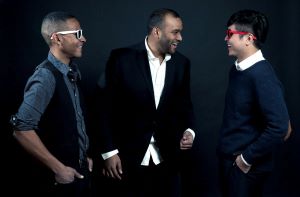The Brevard Philharmonic under the direction of Maestro Donald Portnoy ended its season in the Porter Center of Brevard College with one of its strongest performances to date. The program of sentimental favorites by Smetana, Chabrier and Tchaikovsky, coupled with a North Carolina premiere of Paulo Bellinati’s brilliant Concerto for Two Guitars and Orchestra performed by Brasil Guitar Duo artists João Luiz and Douglas Lora brought the audience to their feet several times. Portnoy’s energetic and incisive conducting elicited some very fine playing from the orchestra and its distinguished guests, an affirmative closing to a very busy season.
Luiz and Lora met in Sao Paulo as teenagers and have been performing together for more than twelve years. They have garnered many artistic accolades, among them winning the 2006 Concert Artists Guild International Competition. They tour around the world, and have recorded for the Naxos label. Onstage they are poised and confident players who seem very much at home in one another’s company.
With his two-guitar concerto, Bellinati has contributed a unique and compelling composition, one which draws on the forms and styles of his native Brazilian heritage with its traditional instrument, the viola caipíra or Brazilian ten-string folk guitar, but transformed here for modern guitars. The Brasil Guitar Duo premiered the concerto in June 2012 with The Orquestra Sinfônica do Estado de São Paulo led by Giancarlo Guerrero.
Bellinati’s opening movement is unusual for a concerto. In place of a fast, driving Allegro we heard an opening cadenza by the two players where the musical materials were shared, much like conversation. The orchestra entered next with the two players tacit (each group keeping well out of one another’s way) with surprisingly laid-back, easy-going music, which was interrupted by another cadenza shared by the two soloists. While intensity and drive increased throughout the movement, one never lost sight of the improvisational spirit of the piece, and the relatively relaxed musical pace in which this could unfold.
The second movement Adagio was inspired by Brazilian songs known as modas de viola. According to the composer, “these are traditionally performed by a duo called dupla caipíra, with the singers harmonizing in parallel thirds or sixths and very often accompanying themselves, one playing guitar and the other viola caipíra. The ‘question and answer’ structure also appears frequently in música caipíra, and, as this is an instrumental duo, I tried to extend that to the orchestral writing, which is all framed by the countryside atmosphere with its serenades and troubadours.” One could frequently hear rhythmic ostinatos used in one guitar as accompaniment for the other. More ostinatos occur in the fast and final movement “Ponteado” (fast finger-picking folk style), a brilliant moto perpetuo of catchy rhythms and flashing fingerwork. Bellinati’s clever scoring of the orchestral parts and Portnoy meticulous direction of the orchestra’s dynamic levels ensured that the two guitars were never overpowered. Responding to the audience’s enthusiastic reception of the piece, Luiz and Lora performed a samba by Bellinati, exhibiting unique styles of strumming and a range of guitar timbres.
The three other works on the program likewise referenced folk music or musical culture. Opening the concert was Bedrich Smetana’s “The Moldau,” a programmatic one-movement journey down Bohemia’s heartland from the orchestral cycle Má vlast (My Country). This is familiar and appealing concert music, to be sure, but the orchestra gave it a lively and nuanced reading. Especially noteworthy was the “moonlight” sequence with its delicately muted strings.
After intermission was Emmanual Chambrier’s España, a sort of reminiscence of his trip in 1881 to Spain. Included are actual Spanish dances and folk tunes the composer recorded during his trip, along with original themes. This performance, a study in bold contrasts, was irresistibly appealing.
The heavy-weight of the second half was Tchaikovsky’s Capriccio Italien, Op. 45, a work which also grew out of a trip its composer took. Tchaikovsky maintained the piece was “an Italian fantasia on folk tunes . . . which I have succeeded in assembling, partly from anthologies, partly out on the streets with my own ears.” Clearly it is a favorite among orchestral players, and this ensemble gave it their uninhibited all. Kudos go to each section for their hand in a rousing performance!













